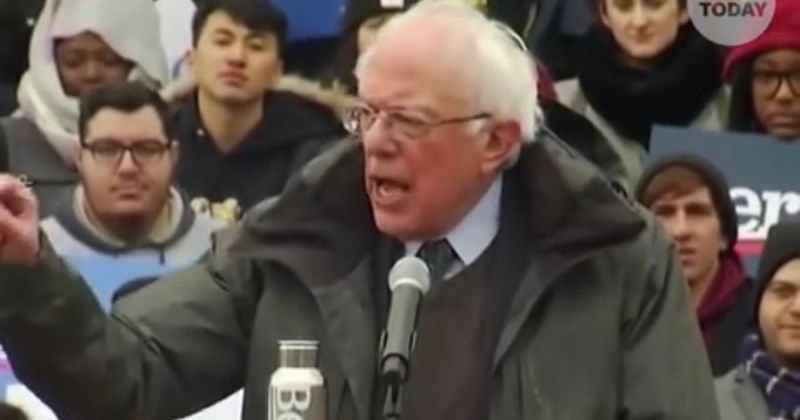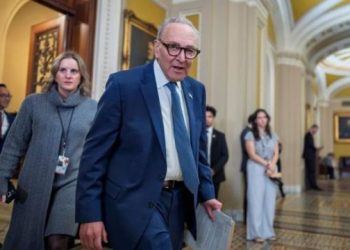Sanders supporters took over the Nevada Democratic Party. It’s not going well.
The senator lets it be known that he’s unhappy with work his followers have done in the critical battleground state.
When Bernie Sanders’ supporters took over the Nevada Democratic Party two years ago, progressives across the country were thrilled.
Socialists had managed to bring down one of the most powerful establishment forces in the nation, the famed Democratic machine built by former Senate Majority Leader Harry Reid. They saw it as a blueprint for the progressive transformation of state parties.
Two years after the experiment began, there are regrets.
Judith Whitmer, the insurgent party chair who wrested control of the party from mainstream Democrats, is facing a challenge in her reelection campaign next month amid doubts from her own former supporters and accusations that she abandoned her progressive principles. And even key figures in Bernie world — including Sanders himself — say they are unhappy and embittered by what’s transpired.
“The senator is pretty disappointed in Judith’s chairmanship, specifically around her failure to build a strong grassroots movement in the state,” said a person familiar with Sanders’ thinking. “A lot of us feel sad about what could have been. It was a big opportunity for Bernie-aligned folks in the state to prove some of the folks in the establishment wrong. And that hasn’t happened.”
The situation has left the Sanders coalition in Nevada fragmented right at the onset of the critical 2024 election. And it has set off larger debates about what, exactly, the progressive movement should be doing during the twilight of the senator’s career. There is even talk that it might simply be a waste of time for the progressives to win control of a state party’s machinery.
“There just has been a complete lack of competence or ability to accomplish anything significant,” said Peter Koltak, a Democratic strategist and former Nevada senior adviser for Sanders’ 2020 campaign, of the current state party leadership. “Look, there’s a lot of well-meaning activists involved there, but they don’t understand the ins and outs of how you build modern campaigns.”
In an interview, Whitmer expressed surprise over Sanders’ disappointment, pointing to a meeting she had earlier this year with him: “I think he would have said to me, ‘Hey Judith, I’m disappointed in what you’re doing’ if that was actually a true statement.”
But even for the most optimistic-minded liberal in the state, the state of disarray among the progressive movement in Nevada represents a shocking turnaround from 2021.
Back then, former Sanders aides, members of the Democratic Socialists of America, and other progressives united to elect Whitmer after working on Sanders’ win in the Nevada presidential caucus a year earlier. Sanders was part of the effort, sending texts from his political committee to encourage people to run for party posts and later fundraised for the state party. At the time, Whitmer promised to make the state party “accountable to the people,” revamp its get-out-the-vote efforts, and leverage the national party to make Nevada the first-in-the-nation primary.
Former Nevada Gov. Steve Sisolak “lost by a very small minority,” said Clark County Commissioner Tick Segerblom, a Sanders-supporting Democrat. “If we could have gotten our voter registration or get-out-the-vote efforts sooner, he could have won.”
The state party didn’t take Whitmer’s victory lightly. Shortly before it was sealed, party staff in an apparent act of protest moved hundreds of thousands of dollars from their own coffers to the Democratic Senatorial Campaign Committee and later quit their positions. Once Whitmer took her post, the Reid machine circumvented the state party and set up a coordinated campaign out of a local party in the state’s second-biggest county. Officials insisted it was necessary because Whitmer lacked experience in winning battleground elections.
“The previous administration pretty much burnt the house down,” said Whitmer. “When we got the keys, there was a lot of reorganization that had to be done. Records were missing and money had been transferred out.”
Whitmer’s critics — including those in the progressive wing — counter that any failures were largely hers. They accused her of having poor relationships with elected officials, of being a poor fundraiser, of failing to build the grassroots organizing infrastructure she promised, and of antagonizing leaders in the party.
They’ve bashed her over the state party’s decision to back a sheriff who appeared to support chokeholds as well as a lieutenant governor candidate, Debra March, who primaried the sitting Democratic lieutenant governor, who had been appointed by then-Gov. Steve Sisolak. They also accused her of trying to rig the March 4 election for state party chair by removing members from the state central committee, which chooses the chair.
This is an excerpt only. Read the full story here.
 Telegram is where we really talk. Don't miss out!
Telegram is where we really talk. Don't miss out!







